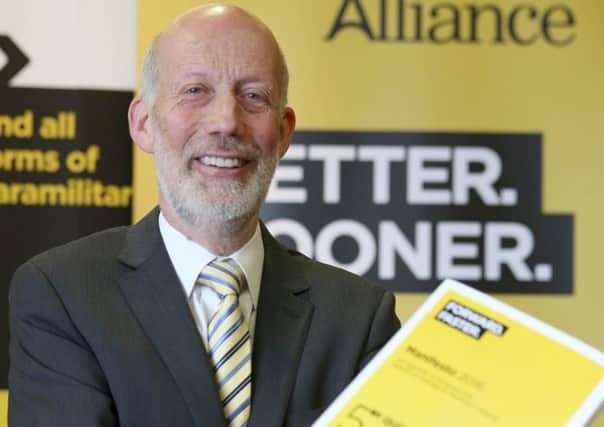After hailing their abolition, Alliance want prescription charges reinstated


At the time when charges were abolished, it was claimed that the charge was preventing patients from availing of healing drugs and it was one of the most popular changes made by the fledgling Stormont Executive in 2008.
The DUP, which like Alliance supported the ending of prescription charges in 2008, has since then attempted to reintroduce them, but that was blocked by Sinn Fein. The DUP manifesto made no mention of the issue.
Advertisement
Hide AdAdvertisement
Hide AdSpeaking at the time, the then Alliance health spokesman Kieran McCarthy said: “This is a great day for our health service.”
But yesterday, Alliance set out a manifesto which proposes the reintroduction of what would be a nominal charge for prescribed medicines.
For most people, the change would make no difference. At the point where charges were abolished, it was estimated that 90 per cent of those getting drugs through the NHS did not pay anything.
However, a move to reintroduce prescription charges would be a symbolic step for a Stormont which has long been comfortable at cutting or freezing various taxes – but which has then struggled to balance its books and has had to cut public services due to budgetary shortfalls.
Advertisement
Hide AdAdvertisement
Hide AdThe manifesto says: “Prescription charges were abolished in Northern Ireland in April 2010, at a cost of up to £30 million pounds in lost resources.
“If small charges were to be reintroduced, it is estimated that just 11 per cent of the population would have to pay, but this would still have the potential to generate a significant sum of money.
“In particular, this could be used to support investment in a wider range of drugs and treatments, and addressing problems of inequality of access between Northern Ireland and the rest of the UK.”
The party proposed that children, senior citizens, pregnant women, people in receipt of benefits and those with chronic or long term conditions would be exempt from any charge.
Advertisement
Hide AdAdvertisement
Hide AdWhen asked if that change of stance was an admission that the party stance in 2008 had been wrong, leader David Ford said that the Province had to “face up to the prospect that we can’t fund public services properly at the present time if we do not deal with a number of different issues”.
He said it was “not an easy and not a populist thing to say” but that the money for public services had to be raised “from somewhere”.
Setting out proposals to tackle the serious problems in both accident and emergency departments and in mounting hospital waiting lists over recent years, the party proposed to invest more in out-of-hours GP services to use more technology to improve waiting times.
In a meaty 84-page manifesto, the party set out detailed proposals across the range of Stormont responsibilities.
Advertisement
Hide AdAdvertisement
Hide AdAmong those are pledges to: * Promote the education of Roman Catholic and Protestant children together in integrated schools and supporting shared neighbourhoods;
* Require every minister to tackle division so that money is re-invested in front line services like health and skills;
* Introduce greater transparency around political donations and reform of the Assembly to create a government and an opposition rather than mandatory coalition;
* Invest at least an additional £85 million a year in improving the skills of the Northern Ireland workforce.
Advertisement
Hide AdAdvertisement
Hide AdA bullish Mr Ford set out his belief that the party can win up to four more seats in next month’s election, taking it from the current eight MLAs to as many as 12.
He said: “It is time we stopped the delay, the fudge and the waffle of the other parties and moved ahead, further and faster, to build a united community.”
Mr Ford said that there needed to be a “modest” increase in the regional rate, highlighting that it had been frozen since the restoration of devolution in 2007.
The South Antrim candidate said: “Rates will have to rise slightly above inflation.”
Advertisement
Hide AdAdvertisement
Hide AdPressed on what sort of figure could be involved, Mr Ford said “a few per cent”, but added that households in Wales pay twice as much as those in Northern Ireland.
Party has red lines – but won’t detail them
David Ford said that his party has ‘red lines’ which it would not cross in the negotiations on forming a new Executive.
However, the political veteran steadfastly declined to say what those were, other than to say that the party would require “progress” in the five key areas set out in the manifesto.
The Alliance manifesto also proposes to limit payments to the wealthiest farmers out of the Common Agricultural Policy (CAP).
And the party wants to see further restrictions on tobacco.
The manifesto calls for the introduction of more “measures to discourage smoking, including controlling where smoking can occur, and to regulate the sale of tobacco products”.